The Five Pillars of Islam are fundamental practices in Islam, considered to be obligatory acts of worship for all Muslims. They are summarized in the hadith of Gabriel. The Sunni and Shia agree on the basic details of the performance and practice of these acts, but the Shia do not refer to them by the same name. They are: Muslim creed, prayer, charity to the poor, fasting in the month of Ramadan, and the pilgrimage to Mecca for those who are able.

The Quran, also romanized Qur'an or Koran, is the central religious text of Islam, believed by Muslims to be a revelation from God. It is organized in 114 chapters, which consist of verses. In addition to its religious significance, it is widely regarded as the finest work in Arabic literature, and has significantly influenced the Arabic language.

A baby shower is a party centered on gift-giving to celebrate the delivery or expected birth of a child, and the transformation of a woman into a mother.
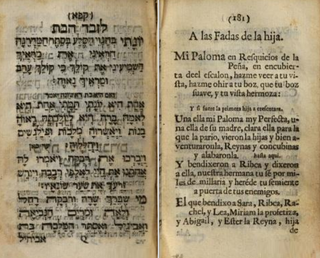
Zeved habat or Simchat Bat is the Jewish naming ceremony for newborn girls. The details of the celebration varies somewhat by Jewish community and will typically feature the recitation of specific biblical verses and a prayer to announce the name of the newborn child.

Al-Fatiha is the first surah (chapter) of the Quran. It consists of 7 ayah (verses) which are a prayer for guidance and mercy. Al-Fatiha is recited in Muslim obligatory and voluntary prayers, known as salah.

The Basmala, or Tasmiyyah, is the titular name of the Islamic phrase "In the name of God, the Most Gracious, the Most Merciful". It is one of the most important phrases in Islam and is used by Muslims mostly before starting "good deeds" as well as beginning of most daily actions.
Al-Insan ("Human") is the 76th chapter (surah) of the Quran, with 31 verses (ayat).
Interfaith marriage, sometimes called a "mixed marriage", is marriage between spouses professing different religions. Although interfaith marriages are often established as civil marriages, in some instances they may be established as a religious marriage. This depends on religious doctrine of each of the two parties' religions; some prohibit interfaith marriage, and among others there are varying degrees of permissibility.

Ahl al-Bayt refers to the family of the Islamic prophet Muhammad, but the term has also been extended in Sunni Islam to all descendants of the Banu Hashim and even to all Muslims. In Shia Islam, the term is limited to Muhammad, his daughter Fatima, his cousin and son-in-law Ali ibn Abi Talib, and their two sons, Ḥasan and Husayn. A common Sunni view adds the wives of Muhammad to these five.
Hamd is a word that exclusively praises God - whether written or spoken. Thus, The word "Hamd" is always followed by the name of God (Allah) - a phrase known as the Tahmid - "al-ḥamdu li-llāh". The word "Hamd" comes from the Qur'an, and الحَمْد لله is the epithet or locution which, after the Bismillah, establishes the first verse of the first chapter of the Qur'an - al Fatiha Mubarak.
Islamic Inheritance jurisprudence is a field of Islamic jurisprudence that deals with inheritance, a topic that is prominently dealt with in the Qur'an. It is often called Mīrāth, and its branch of Islamic law is technically known as ʿilm al-farāʾiḍ.
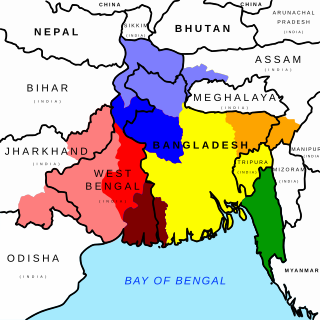
A Bengali Muslim wedding is a Bengali wedding in accordance to Muslim faith which includes very few rituals and ceremonies that may span up to three days max. In most cases, it starts with the Paka Dekha ceremony. Then, nikkah which is done by a kaji with a fixed denmohor and it ends with the Bou Bhat ceremony that is popular as the wedding reception arranged by the groom's family.
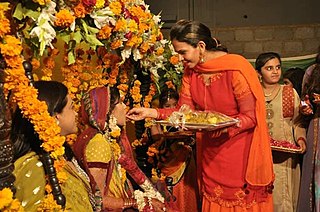
Marriage in Pakistan pertains to wedding traditions established and adhered by Pakistani men and women. Despite their local and regional variations, marriages in Pakistan generally follow Islamic marital jurisprudence. Marriages are not only seen as a union between a husband and a wife, but also an alliance between their respective families. These traditions extend to other countries around in the world where Overseas Pakistani communities exist.
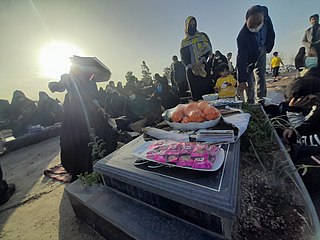
Shab-e-Barat, Barat Night, Cheragh e Barat, Berat Kandili, or Nisfu Syaaban is a cultural celebration celebrated in many South Asian, Central Asian, South East Asian and Middle Eastern Muslim countries, on the 15th night of the month of Sha'ban, the eighth month of the Islamic calendar.
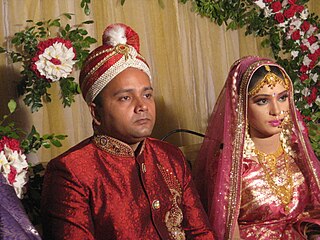
Muslim marriage and Islamic wedding customs are traditions and practices that relate to wedding ceremonies and marriage rituals prevailing within the Muslim world. Although Islamic marriage customs and relations vary depending on country of origin and government regulations, both Muslim men and women from around the world are guided by Islamic laws and practices specified in the Quran. Islamic marital jurisprudence allows Muslim men to be married to multiple women.
Bismillah ceremony, also known as Bismillahkhani, is a cultural ceremony celebrated mostly by Muslims from the subcontinent in countries such as Bangladesh, India and Pakistan. It marks the start for a child in learning to recite the Qur'an in its Arabic script. It is not a religiously prescribed milestone. The ceremony marks how a child should read the Qur’an and say prayers properly. The ceremony is named after the bismillah, the beginning words in the Qur'an.

Salah, also known as namāz, is worship performed by Muslims. Facing the qibla, the direction of the Kaaba with respect to those praying, Muslims pray first standing and later kneeling or sitting on the ground, reciting prescribed prayers and phrases from the Quran as they bow and prostrate themselves in between.
Islamic family jurisprudence or Islamic family law or Muslim Family Law is the fiqh of laws and regulations related to maintaining of Muslim family, which are taken from Quran, hadith, fatwas of Muslim jurists and ijma of the Muslims. It contains pubertal, marital, sexual, child upbringing, adoption and fostering, inheritance, criminal and other related subjects. The subject mainly discusses on foster relationship, marriage, divorce, Ila, li'an, Raj'ah, Khul', Zihar, Iddah, custody and maintenance of children etc. From the political aspects, Muslim family law is a part of almost every national constitution of the world regarding religious (Muslim) laws, especially of the Muslim-majority countries.
Superstition is an excessively credulous belief in supernatural causality: the belief that one event is the cause of another without any physical process linking the two, such as astrology, omens, witchcraft, and apotropaic magic. According to Rashid Shaz the whole Muslim world is permeated with pre-Islamic superstitions, which he relates to "clinging to false hope" and even shirk.
The term Quran code refers to the claim that the Quranic text contains a hidden mathematically complex code. Advocates think that the code represents a mathematical proof of the divine authorship of the Quran. Proponents of the Quran code claim that the code is based on statistical procedures, however, this claim has not been validated by any independent mathematical or scientific institute.










